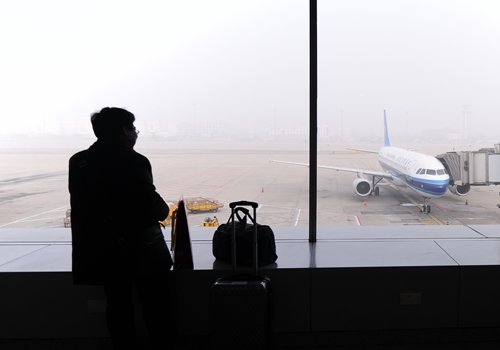IATA calls on China to adopt global standards
Domestic airports suffering from shortage of arrival, departure slots

A passenger looks out over the tarmac at Beijing Capital International Airport in December 2016. Photo: CFP
Slot and traffic rights distribution in China has always been a contentious issue, and obtaining desirable arrival and departure slots at airports remains a top concern for foreign and domestic airlines.The latest conflict came in the form of a complaint from American Airlines (AA), one of the largest carriers in the US. The airline filed a formal objection with the US Department of Transportation to block Air China from renewing its permit to fly between Beijing and Houston.
Although the Civil Aviation Administration of China (CAAC) and AA declined to comment or disclose the result of the complaint when contacted by the Global Times, the situation shows that slot distribution has aroused a lot of attention.
The CAAC vowed to undertake reforms to make slot distribution more transparent, such as by introducing slot auctions in some airports.
However, the auction system favors rich airlines, said Alexandre de Juniac, director general and CEO of the International Air Transport Association (IATA), at a media briefing in Beijing on February 17.
The system is bad for the fair allocation of slots and for competition in the commercial aviation industry, de Juniac said.
Restraining of the time schedule could happen for each airline, and the IATA's stance is to find a solution to the problem regarding the standard, he said.
The IATA is negotiating with the CAAC to make departure and landing time in China more in line with the Worldwide Scheduling Guidelines (WSG).
At the end of 2015, Guangzhou Baiyun International Airport, in South China's Guangdong Province, held its first slot auction.
The airport raised more than 550 million yuan ($79.98 million) by auctioning nine pairs of landing and departure slots. Urumqi Air, a subsidiary of China's fourth largest carrier Hainan Airlines, made the highest bid for one of the slots - 90.99 million yuan.
In January 2016, Shanghai Pudong International Airport launched its "ballot-plus fee" allocation model for 14 pairs of slots.
Although the regulator said the pilot program aims to increase the transparency for private airlines competing with the State-owned carriers, most of the winners of the auction in Guangzhou, were China's major airlines.
Slot shortage
The IATA chief's remarks show the extent of the slot shortage problem.
Since 2015, China's transport capacity has exceeded that of the US. As more airlines have opened routes in second- and third-tier cities, the gap has grown larger.
Currently, traffic rights in the first-tier cities of Beijing, Shanghai and Guangzhou have almost been completely allocated. Winning a good slot has become more important.
The slots that airlines value most are the hours between 9 am and 9 pm. Passengers try to avoid flights at other times.
However, the reality is that the schedule at Beijing Capital International Airport (BCIA) is nearly full, and the city's new airport is still two to three years away from completion.
There is less of a possibility that BCIA will have more routes this year because it failed to meet the CAAC's punctuality rate in 2016. As punishment, the regulator may not permit new routes.
The fact is in line with the response made by the CAAC North China Regional Administration when the president of Delta Airlines of China visited in hopes of gaining more slots at the airport.
In a notice posted on its website, the CAAC said it is difficult to increase the number of slots because each one has been used to high efficiency.
In the meantime, it is hard to get the distributed slot back. Also, the tardiness rate also makes increasing the number of new routes impossible.
According to the CAAC website, each slot carries about 165 passengers, higher than overseas airports in terms of efficiency.
In 2016, the US Department of Transportation gave AA permission to fly a daily route from Los Angeles to Beijing.
However, AA found it could not win a slot from the CAAC, and that is the reason why AA objected to Air China renewing its route from Beijing to Houston.
At the briefing in Beijing, Zhang Baojian, the IATA's regional vice president for North Asia, added that slot shortages exist everywhere in the world, and the key complaint is not about airport capacity, but about the transparency of the distribution mechanism.
As suggested by the IATA, China's departure and landing slots should be assigned according to the global standards laid out in the WSG. The highest efficiency can be reached only when every airline follows the same standard, it said.

